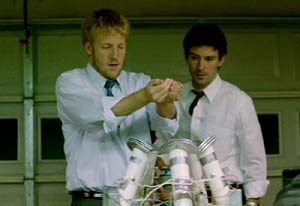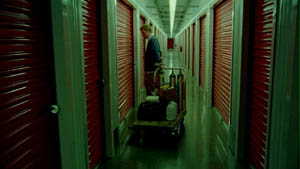|

Stupid people may please get thee hence. Anyone who considers The Transformers to be science fiction, head for the doors now. This is not your film. (If those doors happen to lead to giant pits of lava and poisonous snakes, so much the better.) If you're of average intelligence, flip a coin. You may like it, you may not. The film doesn't come waving an olive branch. It aggressively doesn't care if you get confused. Even if you're quite bright, you're going to get confused here and there. You're supposed to. It's part of the design. 
In a garage in some unnamed American city, four yuppies with engineering backgrounds spend their time working with whatever equipment their meager means can afford them. At one point, this may have been a hobby or other simple distraction. Now, it's about finding something of value, something marketable. Something that might offer a financial respite from their unspecified but boring-seeming yuppie jobs. Aaron, whose garage is home base, seems discontented by the direction in which they're going. Fellow group member Abe is with him on this; despite the democratic process by which they've previously determined how the group's efforts will be directed, the pair decide to pursue their own researches, regardless of the other two. "It's my garage," Aaron reminds his partner. "It's not like they're paying rent." In the process of working with a high-powered superconductor, they create a chamber which seems to reduce the weight of an object placed inside. But this is only the beginning. Over the next few months, during which they fail to secure any financial backing for their projects, new discoveries emerge concerning just what happens inside the box. Since it's virtually impossible to discuss this film in any detail without revealing what they've inadvertantly created, I'm going to say it now. If you don't want to know, blink a lot during the next few paragraphs, and maybe you'll miss it. It's a time machine. Oh, wait? What's that you say? You're perfectly familiar, nay comfortable with time machine stories? You've seen The Terminator and Back to the Future countless times? Yeah? Go fuck yourself. If you had a time machine, that would technically be plausible. This is just how fucked-up things can get when you introduce a concept like a time machine and treat it realistically, which almost never happens. This is not a plutonium-powered DeLorean. This is not, as Doc Brown put it, a time machine with style. For every minute you want to travel into the past, you have to spend a minute inside the box. You start it up at the time at which you want to arrive, wait for, say, six hours, then climb in the box for six hours for the trip backwards. The box is filled with argon gas, so you need an oxygen tank and the ability to spend six hours in the dark in a metal coffin without freaking out. Once back, you try not to bump into yourself, which at the very best would be all sorts of awkward. 
How useful would such a machine be? Almost inconceivably, in a very literal sense. While time machines in popular fiction have often been the source of trouble, it's usually on a large, dramatic scale: with a time machine, a lost war can be won, and doom mankind, or even be the source of one's demise through redacting one's own conception. Almost never have seemingly small-scale issues been addressed, such as what happens when one learns that their own past has been altered by another's trip back. What was lost or changed? Something little, or something significant? The question is by its very nature unknowable. When the possibility becomes apparent that just such an unplanned change has occurred, the reaction is one of resentment. The pair jealously guard all knowledge of the device, shutting out the other group members. Gradually, trust erodes between Aaron and Abe. How tempting would it be to use a time machine for selfish purposes? Almost overwhelmingly, I'd wager. What gradually becomes stunningly apparent is just how unmanageably confusing a time machine would quickly become. If you make a mistake, do you go back to fix it? If so, what do you do about the original iteration of you who is trying to make the original decision? The film tantalizes us with possibilities more than definitive answers. After Aaron's first trip back (or is it? One can never be sure with time travel) we see him riding down the street, hand out the window of the car, feeling the breeze in the sunshine. There's an accompanying feeling we can read in the scene, a treasured, special experience like a day playing hooky, or the afterglow of a first kiss; something sweet, private, shining. By the end, without the earth having come to ruin in an apocalyptic war, one is likely to be convinced that a time machine would be last thing anyone should ever actually create. First-time filmmaker Shane Carruth, who wrote, directed, produced and starred in this feature, should receive accolades for his imagination. For the record, Primer cost only about seven thousand dollars and pretty much looks it. Dark scenes are grainy as hell and, irritatingly enough, look worse the better your TV is. Forget it. See it anyway. It's one of the most exciting films I've seen in a long while; not exciting in the way that blowing up the Death Star is exciting, but in that way of showing you something you'd honestly never seen done before. -review by Matt Murray
|
|
||||||||